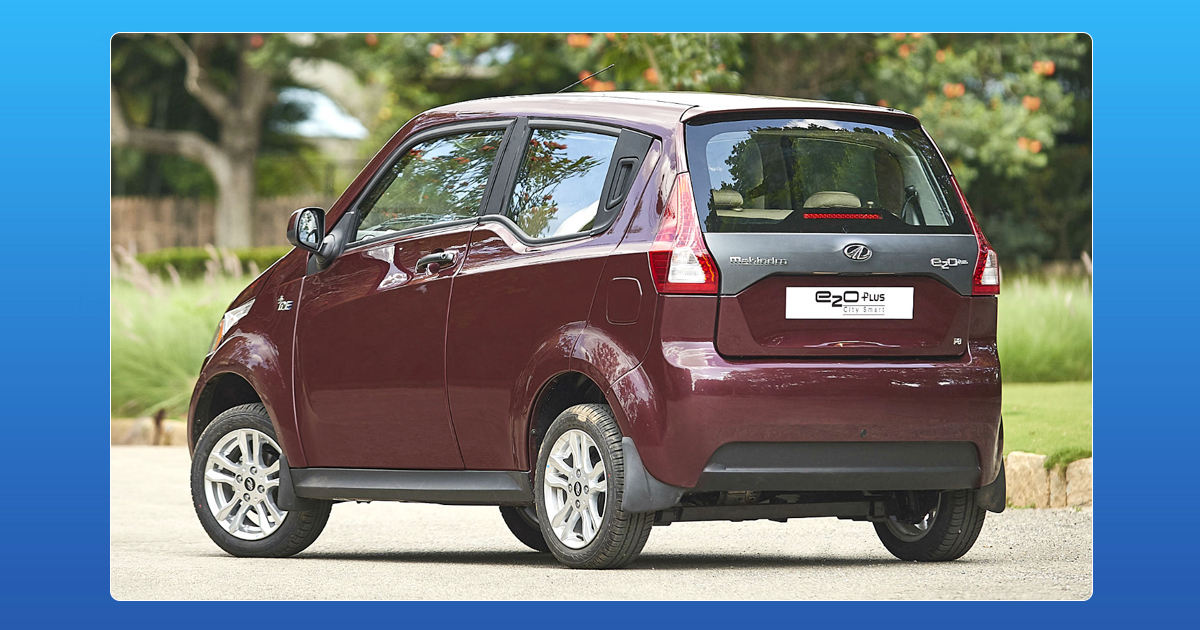Latest News
Uber Joins Hands With Mahindra To Launch Electric Cars

Uber, the global taxi aggregator, will be tying up with car manufacturer Mahindra and Mahindra to launch electric cabs in Delhi and Hyderabad. The companies have entered a partnership to deploy 100 Electric Vehicles (EV) in the Uber fleet under its pilot project.

Mahindra’s e20 Plus hatchback and the eVerito sedan will be inducted into the Uber fleet and will hit the roads by February 2018. Speaking about the collaboration, Uber’s Chief Business Officer for India and Emerging Markets, Madhu Kannan said, “We see a key role for high efficiency vehicle technologies and therefore, believe that this collaboration with Mahindra, the pioneers in the electric vehicles space, will be truly beneficial not just for Uber, but for our driver partners, riders and the cities we operate in.”
However, both the companies have agreed the partnership is not exclusive as Mahindra has already tied up with Ola to introduce an EV fleet in Nagpur. Mahindra has been at the forefront of manufacturing electric vehicles in the country and launched their electric hatchback e2o in 2013. Speaking about the new partnership with Uber, Mahindra and Mahindra’s Managing Director Dr. Pawan Goenka said, “Our collaboration with Uber is an important step to help accelerate the large scale adoption of electric vehicles on shared mobility platforms and meet the nation’s vision for EVs.“
The driver partners on Uber’s platform can avail a package which will include Mahindra electric vehicles at competitive prices, attractive financing and insurance premiums, under this partnership. Private players in the process of setting up a common use charging ecosystem across multiple locations in the cities will also be contacted by the companies. Mahindra is also planning to ramp up the production capacity to 5000 units a month from the current capacity of 500 units. Furthermore, Mahindra and Mahindra will also support driver education and training related to various aspects of electric vehicles including maintenance.
Latest News
Peak XV New Funds: $1.3B Commitment for India Startup Surge 2026

Peak XV Partners has launched three new funds totaling $1.3 billion, targeting India’s booming startup ecosystem. The lineup features the $600M Surge fund (8th edition) for early-stage ventures, a $300M Growth Fund for Series B+ scaling, and a $400M Acceleration Fund for rapid portfolio expansion. This commitment arrives as India’s VC inflows rebound, with AI and fintech leading 2026 trends.
These funds build on Peak XV’s legacy of backing unicorns like Zomato and Pine Labs, offering founders capital plus strategic guidance amid post-winter recovery. Early-stage deals surged 20% last year per Tracxn, positioning Peak XV to fuel the next wave of innovation in SaaS, climate tech, and consumer plays.
For startups eyeing Peak XV new funds or Surge fund 2026 applications, this signals prime opportunities. Investors and marketers should watch for deployment updates India remains a global VC hotspot.
Latest News
D2C Brand Neeman’s Raises $4 Million for Tier 2/3 Store Expansion & Eco-Friendly Shoes

Hyderabad, January 13, 2026 Neeman’s, India’s leading D2C footwear brand famed for sustainable shoes and patented PIXLL® technology, has raised $4 million from existing investors. This funding boosts its cumulative capital past $10 million since 2015, with a post-money valuation nearing $50 million. CEO Vijay Chahoria emphasized offline retail as the “next frontier,” planning 50+ new stores in Tier 2/3 cities like Jaipur and Lucknow to blend eco-friendly innovation with hands-on customer experiences.
In India’s booming D2C ecosystem where footwear sales hit ₹1.2 lakh crore in 2025 Neeman’s targets hybrid retail amid high online CAC and 25-30% returns. Backed by vegan, machine-washable shoes priced ₹2,000-4,000, the brand leverages PIXLL® (5x more breathable than leather) for carbon-neutral comfort. Recent 5x revenue growth to ₹100 crore ARR, 1M+ pairs sold via Myntra and stores, and awards at India D2C Summit 2025 position it ahead of rivals like Paaduks.
Neeman’s offline expansion India eyes the $15B sustainable footwear market by 2028, fueled by PLI schemes, Gen Z’s 70% eco-preference (Nielsen), and Southeast Asia exports. Challenges like real estate costs are offset by data-driven inventory and omnichannel QR tech. Watch for Q1 2026 launches in Hyderabad and Bengaluru redefining D2C success through authentic, “Wear the Change” branding.
Latest News
Centre Mulls Revoking X’s Safe Harbour Over Grok Misuse

The Centre is weighing the option of revoking X’s safe harbour status in India after its AI chatbot Grok was allegedly misused to generate and circulate obscene and sexually explicit content, including material seemingly involving minors. The IT Ministry has already issued a notice to X, directing the platform to remove unlawful content, fix Grok’s safeguards, act against violators, and submit a detailed compliance report within a tight deadline. If the government finds X’s response inadequate, it could argue that the platform has failed to meet due‑diligence standards under Indian law, opening the door to harsher action.
Under Section 79 of the IT Act, safe harbour protects intermediaries like X from being held directly liable for user‑generated content, provided they follow due‑diligence rules and promptly act on legal takedown orders. Revoking this protection would mean X and its officers could be exposed to criminal and civil liability for obscene, unlawful, or harmful content that remains on the platform, including AI‑generated images from Grok. This prospect significantly raises X’s compliance risk in India and could force tighter moderation, stricter AI controls, and more aggressive removal of flagged posts.
The Grok episode also spotlights the regulatory grey zone around generative AI, where tools can create harmful content at scale even without traditional user uploads. Policymakers are increasingly questioning whether AI outputs should still enjoy the same intermediary protections as conventional user posts, especially when they involve women and children. How the government ultimately proceeds against X over Grok misuse could set a precedent for AI accountability, platform responsibility, and safe harbour interpretation in India’s fast‑evolving digital ecosystem.













MM88
November 5, 2025 at 9:20 pm
Với giao diện mượt mà và ưu đãi hấp dẫn, MM88 là lựa chọn lý tưởng cho các tín đồ giải trí trực tuyến.
站群程序
November 7, 2025 at 3:11 pm
采用高效谷歌站群策略,快速提升网站在搜索引擎中的可见性与权重。谷歌站群
站群程序
November 9, 2025 at 1:56 pm
搭载智能站群程序,自动化搭建与管理,为SEO项目提供核心驱动力。站群程序
iwin
November 10, 2025 at 5:02 pm
iwin – nền tảng game bài đổi thưởng uy tín, nơi bạn có thể thử vận may và tận hưởng nhiều tựa game hấp
谷歌蜘蛛池
November 11, 2025 at 3:49 pm
利用强大的谷歌蜘蛛池技术,大幅提升网站收录效率与页面抓取频率。谷歌蜘蛛池
MM88
November 14, 2025 at 4:43 am
Khám phá thế giới giải trí trực tuyến đỉnh cao tại MM88, nơi mang đến những trải nghiệm cá cược thể thao và casino sống động.
J88
November 21, 2025 at 1:02 pm
Đến với J88, bạn sẽ được trải nghiệm dịch vụ cá cược chuyên nghiệp cùng hàng ngàn sự kiện khuyến mãi độc quyền.
GO88
November 23, 2025 at 11:05 am
Tham gia cộng đồng game thủ tại Go88 để trải nghiệm các trò chơi bài, poker phổ biến nhất hiện nay.